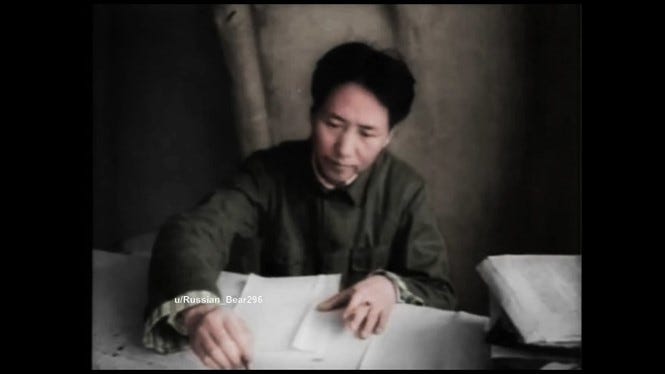Reply to Mr. Liu Ya-tsu [April 29, 1949]
[a shih in seven-word regular, Chi Lu]
[translated by Nancy Lin]
I remember well
The tea we had in Canton
And the exchange of verses in Chungking
When the leaves were yellowing.
That after thirty-one years
I should be back in this ancient capital,
Reading your exquisite lines
Against a sky of fallen petals!
Guard your heart
Against undue regret and sorrow.
Shouldn’t the shape and shift of things
Always be taken with a broadness of view?
Do not say then – Lake Kunming is shallow.
For watching fish at play,
It may well be better
Than the hermit’s Fuchun River.
Notes [by Nancy Lin]
Liu Ya-tsu: A participant in the Revolution of 1911 and supporter of Sun Yat-sen’s policy of alliance with the communists in the 1920s, Liu became eventually a sympathizer of New Democracy and a personal admirer of Mao’s. He was invited to the People’s Political Consultative Conference in Peking in March 1949 as one of the ‘democratic personalities’. He wrote a number of poems in warm praise of Liberation – followed, however, by one entitled Private Thoughts in which he evinced dissatisfaction and spoke of desire to retire as a hermit to his home down south. Chairman Mao wrote the above poem in reply – a piece that by combining friendly regards with political exhortations embodies in effect the spirit of his well-known policy towards the intellectuals, the policy of uniting and remoulding them.
Tea in Canton: Back in 1925-1926, the poet had his first contacts with Liu while he was taking charge of the Training Center for Peasant Movement in Canton.
Exchange of verses in Chungking: August 1945, Mao came to Chungking for the parley on internal peace with Chiang Kai-shek. Liu wrote a poem in Mao’s praise and Mao in turn showed the poem Snow written in 1936.
Ancient Capital: i.e. Peking, which the poet first visited in September 1918 and to which he returned in March 1949.
Lake Kunming refers to the lake at the Summer Palace in Peking.
Watching fish at play: a pastime of literati and poets as part of their contemplative life.
Fuchun River: a river near Hangchow, where an East-Han dynasty hermit Yen Kwang preferred to live as a fisherman rather than accept Emperor Kwang-wu’s offer of an official position. Mao here is mildly suggesting that Liu should stay on in Peking and take an active part in building new China.
[the following is a translation of Liu Ya-tsu’s poem, I found at marxists.org]
My Thoughts Presented to Chairman Mao
You excel as the maker of a new epoch!
Hard it was for me to laud Light in dark times.
Lecturing on classics, I am no time-serving scholar
And, to my sorrow, have met with no warm reception.
Remorse fills me at the thought of my misspent life,
Yet my heart will remain true to the end.
O for glad tidings from the southern expedition!
Lake Fenhu will then be my hermit resort.



